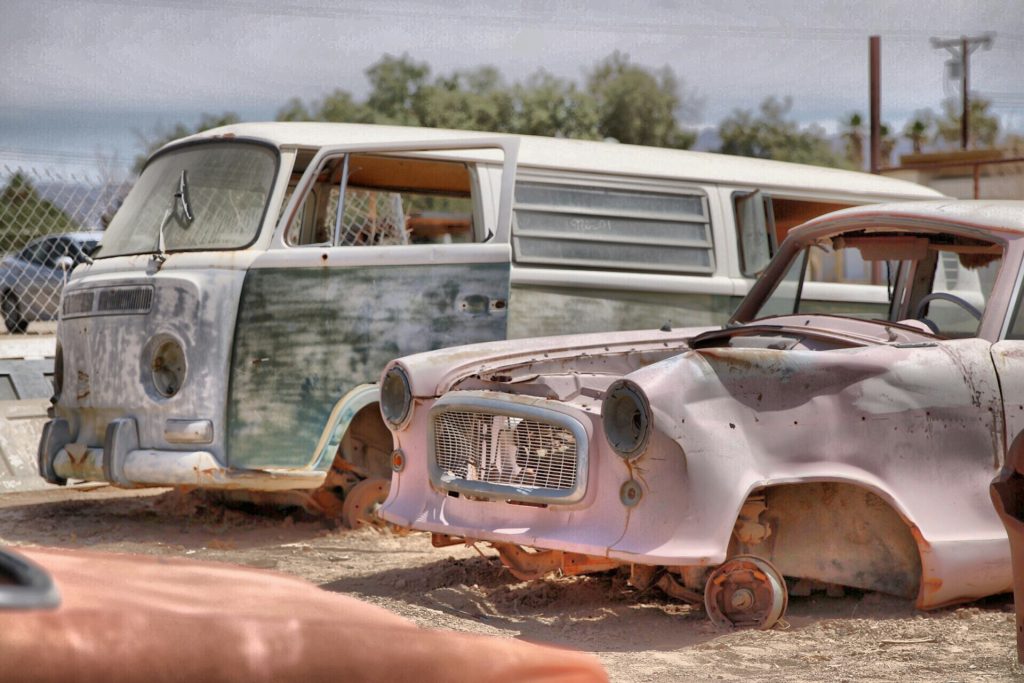Selling a car can be a straightforward process, but it becomes more complex when the car has a salvage title. A salvage title often raises questions about the car’s past and its worth. This article will guide you through the nuances of selling a car with a salvage title, ensuring you’re equipped with the necessary know-how. Targeting salvage car buyers who seek a used car for specific purposes like refurbishment or to sell parts can be profitable. These buyers are often willing to pay a higher price for a car with a salvage title, recognizing its potential value. Successfully transferring ownership requires navigating the Department of Motor Vehicles regulations to potentially obtain a new title, enhancing the car’s market appeal.
Table of Content
- What Does a Salvage Title Mean?
- How a Car Becomes Salvaged
- How to Get a Salvage Car Back on the Road
- Do People Buy Salvage Title Cars?
- Preparing Your Salvage Vehicle for Sale
- Benefits of Selling a Salvage Title Car
- Salvage Title vs Rebuilt Title
- FAQ
What Does a Salvage Title Mean?
A salvage title is assigned to a car that an insurance company deems a total loss. This could be due to extensive damage from accidents, natural disasters, or other events where repair costs exceed the car’s market value. Salvage titles are critical markers in a vehicle’s history, indicating significant past damages. The presence of a salvage car title on a vehicle title signifies to potential buyers or car sales businesses the extent of damage the vehicle has endured. It often leads to a vehicle being used for scrap metal or sold at a significantly reduced price. This major part of the title reflects the vehicle’s condition and heavily influences its future, whether rebuilding, resale, or dismantling.
How a Car Becomes Salvaged

Cars receive salvage titles when insurance companies conclude that the cost of repairs surpasses the vehicle’s pre-damage value. This decision often follows severe accidents, floods, or fires, transforming the car into a salvaged vehicle. Understanding this process is crucial for anyone dealing with salvage vehicles. In this scenario, car titles are changed from “clean” to “salvage”. If the damaged car undergoes repairs and passes inspections, it may be reclassified as a “rebuilt” or “salvaged title car”. To formalize this status, a salvage certificate is issued. Often, vehicles deemed beyond repair end up in salvage yards, bearing a “junk title” or “dismantled title”, indicating their suitability only for parts or scrap.
How to Get a Salvage Car Back on the Road

To make a salvage car legally driven again, it must undergo necessary repairs and pass a safety inspection. The car then receives a rebuilt title, differentiating it from its former salvage status. This process ensures the vehicle is safe and roadworthy. However, this rebuilt status doesn’t equal a clean or clear title. When selling such a vehicle, the focus is on securing the best price, often by emphasizing the quality of replacement parts. A rebuilt car, despite its history, can attract buyers seeking a functional vehicle at a more affordable price than those with a clean title.
Once a salvage car has been restored and issued a rebuilt title, it must meet various legal and documentation criteria before it may be driven again. This includes registering the car with the local Department of Motor Vehicles (DMV), which will show it as having a rebuilt title. Depending on the state’s laws, the registration process may include submitting a rebuilt title, proof of repairs, and passing emissions testing. It is critical for sellers to be aware of these regulations and advise potential buyers, as the process can impact the ease of transferring ownership. Buyers must recognize that, while a rebuilt car saves money, it may require additional efforts to guarantee it meets all road safety criteria.
Do People Buy Salvage Title Cars?
Yes, there’s a market for salvage title cars. Some buyers seek them for spare parts, while others are willing to invest in repairs. These cars often come at a lower price, appealing to a specific segment of car buyers. Private buyers and car dealers alike recognize the salvage title value, and each has a different approach. A private buyer might be looking for a bargain or a project car, aiming to secure a good price. Car dealers, on the other hand, might buy salvage vehicles to refurbish and resell. Some dealers even offer a guaranteed offer for these cars, acknowledging their potential after repairs. This market varies, but the demand for salvage title cars is steady among those who see beyond the title’s implications.
In addition to private customers and car dealers, there is a subculture of salvage title car fans who seek out these vehicles for special projects or collections. This enthusiast market often appreciates a salvage car’s unique history or model, regardless of its functionality. They could be willing to spend more for rare or highly desired models. For sellers, connecting with this passionate community via specialist internet forums or local car clubs might lead to new options. These enthusiasts frequently have a thorough understanding of salvage title cars and can provide helpful insights or reasonable prices based on the vehicle’s uniqueness and potential.
Preparing Your Salvage Vehicle for Sale
When selling a salvage car, transparency is key. Provide potential buyers with a vehicle history report and detailed vehicle details, including the extent of damage and repairs. Ensuring the car is clean and presentable can also help attract buyers. It’s important to differentiate between a salvaged car and those with clean titles. While salvage cars might not fetch the same price as their clean title counterparts, honest disclosure about the car’s condition and history can build trust and facilitate a sale. When you sell a salvaged car, emphasizing the work and investment put into making it roadworthy can also be a compelling selling point for the right buyer.
Focusing on the positive characteristics of a salvage vehicle, such as unique features or enhancements made during repairs, can also be a successful marketing tactic. Highlighting how the car has been improved or altered diverts attention away from its salvage origin and increases the vehicle’s worth. This strategy may appeal to purchasers who value the car’s individuality or customized improvements. Additionally, providing test drives and third-party inspections helps reassure purchasers about the car’s condition and operation. These procedures show trust in the vehicle’s condition and can have a considerable impact on a buyer’s decision, potentially leading to a faster and more profitable transaction.
Benefits of Selling a Salvage Title Car
Selling a salvage car can be beneficial. These vehicles can still hold salvage value for parts or as a project car. You can recoup some expenses by selling instead of leaving the car unused. The process of selling salvage title cars differs from typical car sales, particularly when you sell a car online. Online platforms and car auctions like A Better Bid can broaden your reach to more potential buyers interested in a damaged vehicle. Describing the car accurately, including the extent of damage and any repairs, is crucial in these listings. This transparent approach can help attract serious buyers who understand what they’re getting and are willing to invest in a salvage vehicle.
Salvage Title vs Rebuilt Title
A salvage title indicates a car was deemed a total loss, while a rebuilt title shows the car has been repaired and passed inspection. This distinction is significant for buyers and sellers, impacting the car’s value and insurability. When a salvage vehicle undergoes sufficient repairs and inspections, it transitions from a salvage to a rebuilt title. This can increase its value compared to salvage cars that haven’t been repaired. For sellers, understanding this difference is crucial as it affects how they market and price the car. Buyers often view rebuilt title cars as more valuable than unrepaired salvage cars, considering them a safer and more reliable investment.
Selling a salvage title car requires understanding what a salvage title means, preparing the vehicle for sale, and knowing the market. With the right approach, you can successfully sell a salvage-titled car. Additionally, setting a realistic price that reflects the car’s condition and salvage title status is crucial. Being honest and transparent about the vehicle’s history and current state helps in building trust with potential buyers. Utilizing online platforms and specialized forums can also widen your reach, connecting you with interested parties across a broader geographic area.
![]() FAQ
FAQ
Show more
How Much Value Does Your Car Lose If It Has a Salvage Title?
A salvage title can significantly reduce a car’s value, often by 20-40% of its retail value. The exact amount depends on the vehicle’s condition and market demand. Factors like make, model, age, and the extent of the damage also play a crucial role in determining the depreciation.
Can You Get Insurance on a Salvage Title Vehicle?
Yes, but options are limited. Some car insurance companies may offer liability insurance for salvage title vehicles, but comprehensive coverage is rare. Additionally, the cost of insuring a salvage title vehicle might be higher due to the perceived increased risk.
Are Salvage Titles Worth the Risk?
It depends on your purpose and expertise. For spare parts or a repair project, salvage titles can be worth it. For daily use, consider the risks carefully. Potential safety concerns, insurance challenges, and resale difficulties might outweigh the initial savings. Each case should be evaluated on its own merits and risks.
Recommended Articles
:format(webp)/vulcan.abetter.bid%2Fwp-content%2Fuploads%2F2024%2F05%2Fyoung-shih-gqypxOb4_R0-unsplash.jpg)

:format(webp)/vulcan.abetter.bid%2Fwp-content%2Fuploads%2F2024%2F01%2Fmc-kontext-WKl8K3zOwmk-unsplash.jpg)
:format(webp)/vulcan.abetter.bid%2Fwp-content%2Fuploads%2F2022%2F10%2F2022-10-05-11.30.40-150x150.jpg)
 FAQ
FAQ :format(webp)/vulcan.abetter.bid%2Fwp-content%2Fuploads%2F2023%2F07%2Ftara-meinczinger-kVakWKgidgE-unsplash.jpg)
:format(webp)/vulcan.abetter.bid%2Fwp-content%2Fuploads%2F2022%2F10%2F2022-10-05-11.31.58-150x150.jpg)
:format(webp)/vulcan.abetter.bid%2Fwp-content%2Fuploads%2F2025%2F09%2Fsai-kalyan-achanta-OeGVL6vuPUI-unsplash.jpg)
:format(webp)/vulcan.abetter.bid%2Fwp-content%2Fuploads%2F2025%2F08%2Funsplash-community-yLrIO-F_7Jc-unsplash.jpg)
:format(webp)/vulcan.abetter.bid%2Fwp-content%2Fuploads%2F2025%2F08%2Fgetty-images-dsLmP47anSs-unsplash.jpg)

